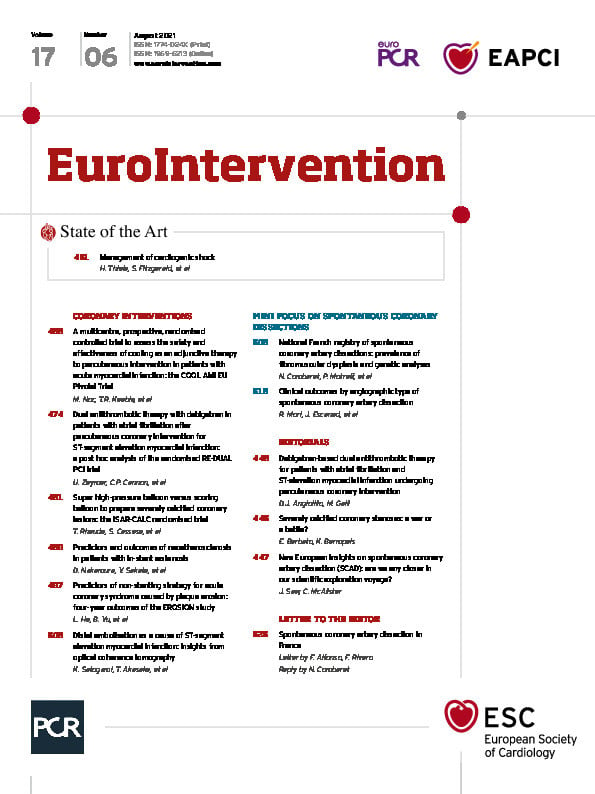We appreciate the letter to the editor written by Alfonso et al1 and read it with interest.
It is remarkable to note that many results concerning demographic and clinical data are indeed similar in these two registries2,3 which represent the two main cohorts of spontaneous coronary artery dissection (SCAD) in Europe. The management of SCAD also seems to be comparable, with a majority of patients treated medically with favourable evolution. Patients initially treated with PCI had more major adverse cardiac events (MACE) at one year (22.4% in the PCI group vs 10.2% in the medical group; p<0.01). Among 58 patients treated by PCI, 13 MACE occurred, the majority before discharge: 5 patients presented an extension of the initial SCAD with a median delay of 1 day (1-5). Four patients were controlled for reinfarction without recurrence or SCAD extension on angiograms (median delay at 18.5 days [0.7-80.7]) and four recurrences occurred (median delay at 183 days [154-230]). All clinical events were centrally adjudicated from medical records with analyses of the angiograms by the same initial core lab.
In the whole cohort, 24 re-hospitalisations for acute coronary syndrome were observed (12 for recurrent SCAD, 12 for reinfarction [including 5 SCAD extensions]).
Medical management remains the recommended strategy in the setting of SCAD whenever possible. Beta-blockers were associated with a lower risk of recurrence in a Canadian cohort4. In the French registry, 12.4% of patients with beta-blockers presented a MACE at one year versus 10.3% in patients without beta-blockers (p=0.66). The risk of recurrence is lower in patients with beta-blockers, but the difference is not statistically significant (recurrence rate at one year of 2.85% in patients with beta-blockers versus 5.17% in patients without beta-blockers; p=0.35).
Concerning antithrombotic treatment, we observed an increased risk of MACE in patients on dual antiplatelet therapy (17.8% in patients on DAPT versus 9.6% in patients without DAPT; p=0.02). We can partly explain this difference by the fact that patients on DAPT have a more severe initial clinical presentation (persistent pain, ECG changes, haemodynamic instability) that requires initial PCI management with a potentially less favourable evolution.
We completely agree with Alfonso et al on the necessity of international collaboration to share data on SCAD and to develop international and prospective studies on this intriguing disease.
Conflict of interest statement
The author has no conflicts of interest to declare.
Supplementary data
To read the full content of this article, please download the PDF.

